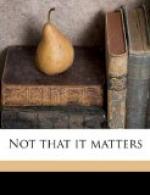When you engage a gardener the first thing to do is to come to a clear understanding with him about the peaches. The best way of settling the matter is to give him the carrots and the black currants and the rhubarb for himself, to allow him a free hand with the groundsel and the walnut trees, and to insist in return for this that you should pick the peaches when and how you like. If he is a gentleman he will consent. Supposing that some satisfactory arrangement were come to, and supposing also that you had a silver-bladed pocket-knife with which you could peel them in the open air, then peaches would come very high in the list of fruits. But the conditions are difficult.
Gooseberries burst at the wrong end and smother you; melons—as the nigger boy discovered—make your ears sticky; currants, when you have removed the skin and extracted the seeds, are unsatisfying; blackberries have the faults of raspberries without their virtues; plums are never ripe. Yet all these fruits are excellent in their season. Their faults are faults which we can forgive during a slight acquaintance, which indeed seem but pleasant little idiosyncrasies in the stranger. But we could not live with them.
Yet with the orange we do live year in and year out. That speaks well for the orange. The fact is that there is an honesty about the orange which appeals to all of us. If it is going to be bad— for even the best of us are bad sometimes —it begins to be bad from the outside, not from the inside. How many a pear which presents a blooming face to the world is rotten at the core. How many an innocent-looking apple is harbouring a worm in the bud. But the orange has no secret faults. Its outside is a mirror of its inside, and if you are quick you can tell the shopman so before he slips it into the bag.
Signs of Character
Wellington is said to have chosen his officers by their noses and chins. The standard for them in noses must have been rather high, to judge by the portraits of the Duke, but no doubt he made allowances. Anyhow, by this method he got the men he wanted. Some people, however, may think that he would have done better to have let the mouth be the deciding test. The lines of one’s nose are more or less arranged for one at birth. A baby, born with a snub nose, would feel it hard that the decision that he would be no use to Wellington should be come to so early. And even if he arrived in the world with a Roman nose, he might smash it up in childhood, and with it his chances of military fame. This, I think you will agree with me, would be unfair.
Now the mouth is much more likely to be a true index of character. A man may clench his teeth firmly or smile disdainfully or sneer, or do a hundred things which will be reflected in his mouth rather than in his nose or chin. It is through the mouth and eyes that all emotions are expressed, and in the mouth and eyes therefore that one would expect the marks of such emotions to be left. I did read once of a man whose nose quivered with rage, but it is not usual; I never heard of anyone whose chin did anything. It would be absurd to expect it to.




